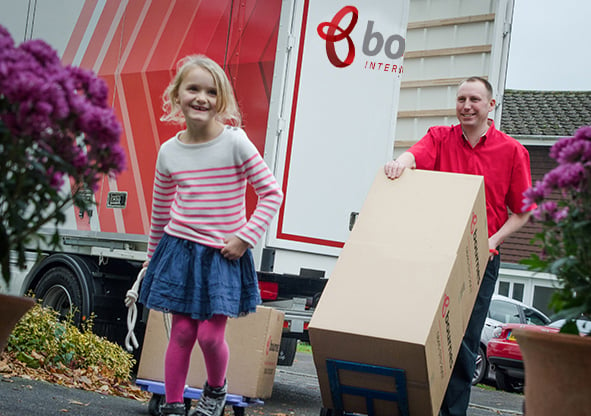Organising an international house move is a big task. But when there are children involved, the process can become even more complicated. If you're about to move with your family and are worried about the effects all the sudden changes will have on your children, then here are our top tips for moving internationally with children.
Preparing children for an international move
However far you're going, there's no doubt that moving house is an unsettling experience for children. They have probably grown attached to their familiar surroundings and may be nervous or worried (or hopefully excited!) about moving to a new country, a new house, new school and everything that is changing. So, before you go:
1. Tell them about moving house as soon as possible:
One of the best tips for moving internationally with children is to give them time to think about the move and prepare. Be ready for the questions that will inevitably follow. Tell them exactly where you're moving to, when you're moving and why. Encourage them to talk about the move and ask questions. Try to be as positive as possible about how the change affects them in your answers and help them problem-solve any concerns they have. If you don’t know the answers yet then tell them it’s a great question and you’re going to find out, then make sure you go back to them.
2. Tell them about the benefits of the move, the new opportunities and exciting aspects:
Are they going to a new school? Will there be new activities they can get involved in? Are there local sports teams etc they might be interested in? These are all positive things to look forward to that your children can start to build up excitement for - especially if their new school or community offers activities they have never tried before. For younger children role play is a great way to aid comprehension and to spark some of those questions you may not have thought about.
3. Get visual:
Show your children some pictures of the place you are moving to, the new house if you have them or maybe some maps etc so they can picture how things are going to be. Look at the route you’ll take and how you'll get there, and maybe even show them some pictures of the neighbourhood online so they can really visualise things.
For younger children why not use our printable colouring in sheets to help start discussions and get them to open up about their questions or concerns.
 Image via Pexels
Image via Pexels
4. Be positive about the move:
Even if the circumstances surrounding your move aren’t particularly positive, make sure you try to keep stressful discussions about the move away from little ears; if they are particularly nervous or anxious then this might make them feel more scared. Try to focus largely on the positives - things like all the new opportunities and exciting things the move will bring to them and your family, and talk about all the fun ideas to keep in touch with friends and family back home.
5. Get the kids involved in planning the relocation:
If you are buying new furniture or choosing paint or soft furnishings for your new house then ask their opinion. Let them research their new area - for example local clubs and teams, places to visit, what their school is like, etc. If they can use the internet then help them to browse online and ask them to find out about things like what the weather in your new country will be like and the new foods and languages they will be experiencing so that they feel like they are helping you to find out at the same time they are.
If you are viewing homes and are comfortable doing so why not take them along? give them a checklist of things to count or to look out for, or a notebook to make notes on their opinions. Encourage them to ask any questions they have.
 Image via Pexels
Image via Pexels
6. Plan to keep in touch:
Get older kids to make an address book with all the contact details of the friends they want to stay in touch with. Gather any email addresses of other parents you normally see at school or their old teachers so that you can send and receive pictures to keep up to date.
7. Get in touch in advance:
Pen pals are a great way to build your child's interest in their new home – is it possible to write to your child’s new school and ask whether they can arrange something like this? Maybe your child can write to his/her class or a few classmates in advance so that they know they have some new friends waiting when they get there, which will make the prospect of their first day at new school less scary! Or perhaps, if you're relocating with your employer you might already know of some other families out in your new country that your children can write to for advice. (Ask your HR team to connect you if there is already an expat population in your host location - this is great for grown-ups too!)
8. Saying goodbye:
Why not let the kids have a few friends and family members over for a going away party to say goodbye? This will be one of the hardest parts of moving internationally with children, so try and make it as fun and light-hearted as you possibly can. Maybe decorate the house in the theme of the new country or get some of the local delicacies for people to try if you can - this way the children will be less focused on the sadness of saying goodbye and more enthused about 'showing off' their new lifestyle.
9. Pack an essentials case:
It's likely that due to the nature of your move, you'll arrive in your new destination before the majority of your belongings. Therefore, it's important to make what you travel with count more than usual. You'll be able to replace the majority of things you'll automatically want to pack once you get to your new destination, so don't waste valuable space on things like toiletries and towels when you could be packing things you really need. Make sure children have enough to keep them entertained on the flight (especially if it's long haul), as well as having all the essentials and a few favourite toys for the first couple of weeks in your new house.
Moving Day

10. Pack a 'last in first out' box
Put all the things you know you will want first when your shipment arrives into a box and ask the movers to load this last. That means it will be first out when the shipment arrives - this could include toys you'll know the children will have missed most or items they will be excited to set up in their room.
11. Think about where children will be on moving day
Should children be present on moving day? There are arguments on both sides! For health and safety/practical/stress reasons it's often considered best that children are away from the house on move day, but there are also some benefits to making sure they feel involved and can understand and process what's happening - particularly if they are going to be separated from their belongings for some time and want to understand where they are going and what will happen with them.
You know your children best, so do what you think is right for them.
If children will be present on moving day, the next few tips will help it run smoothly.
12. Plan entertainment and how children can be involved on move day
Think about what children will do on move day, when their usual toys and entertainment might slowly start being packed and loaded. Make sure to have things to keep them occupied, like colouring books, games or favourite shows on a tablet. Older children might like to help with small jobs like cleaning, labelling or unpacking if it's delivery day. If you're moving in good weather pack some outdoor toys/games or a picnic to enjoy in the garden.
13. Think about health and safety during packing, loading and delivery.
Have you ever watched movers work? They can be fast so it's important to make sure everyone is safe as they move around your home carrying heavy boxes and furniture. Speak with the team leader when your crew arrive to ask what you need to do/know to keep everyone safe.
Try to keep children away from the moving truck unless invited by the crew. They will be busy doing their job and will likely move fast when loading/unloading. Keeping children clear of hazardous areas can prevent the risk of injuries to everyone, and damage to items that might be dropped or knocked due to an unexpected trip hazard! You could ask the crew to give a quick tour before they start to settle curious minds!
14. Expect the unexpected
Every parent knows that the unexpected can and will happen. Keep some emergency supplies separate from the packing - a change of clothes, bottles of water and a small first aid kit - just in case!
Post Move – At your new home
15. Have a welcome party:
Invite the neighbours and have them bring their kids. Organise some games to help the kids get to know each other and break the ice. Not only does it encourage them to get settled but it also helps you to meet the neighbours and make new friends too!
16. Get unpacked, settled and into your new routine as quickly as possible:
A sense of routine - no matter how different it is from your old one - is vital for helping all members of the family settle in quickly. Unpack what you have as soon as you arrive in order to fill the house with familiar items and make it feel like home, and establish some sort of order for the next few days - whether it be cleaning, decorating, shopping for groceries or even just taking a walk around your new neighbourhood - to help everyone get their bearings.
 Photo by cottonbro studio via Pexels
Photo by cottonbro studio via Pexels
17. Help your kids make new friends (and stay in touch with friends back home):
Try and get involved in the local community and school events as soon as you can to help support your child's transition from their old life to new - but don’t forget they’ll probably still be missing their old friends so help and encourage them to use video chat or write an email or letter to keep in touch.
18. Let your kids set up or help plan their new room:
Where feasible, let them help with choosing things for their new room or even get them involved in the decorating. The quicker they feel comfortable in their new surroundings, the better.
19. Think about language training
If your child does not speak the local language consider arranging some language training for them. This can be arranged before you leave, on arrival or a combination of both. Some courses are in person, others virtual and can offer a range of 1:1, group or family sessions. Make sure the training is tailored to the child's age so they learn the language tools they need to thrive in their new home. If you are being relocated by your employer ask if these tools are part of your relocation package.
20. Think about cultural training
If your new country has a vastly different culture to your home country you might also want to consider Cultural training to help your kids understand how things might be different and to behave appropriately to avoid challenging situations and make sure your child feels confident and comfortable. If you are being relocated by your employer ask if these tools are part of your relocation package.
In conclusion, moving internationally with children can be a daunting task, but with the right preparation and support, it can also be an exciting adventure for the whole family.
If you're moving internationally with children that are slightly older and are worried about how they're coping with the prospect of moving, then why not get them to read our moving guide? Written especially for them, this has some good tips and advice on making the process as stress free as possible.
For more information and advice on moving internationally, please visit our International Removals page, where you'll find everything you need to know about moving overseas.

.png)
.jpg?width=591&height=391&name=Child%20on%20Move%20Day%20(small).jpg)










